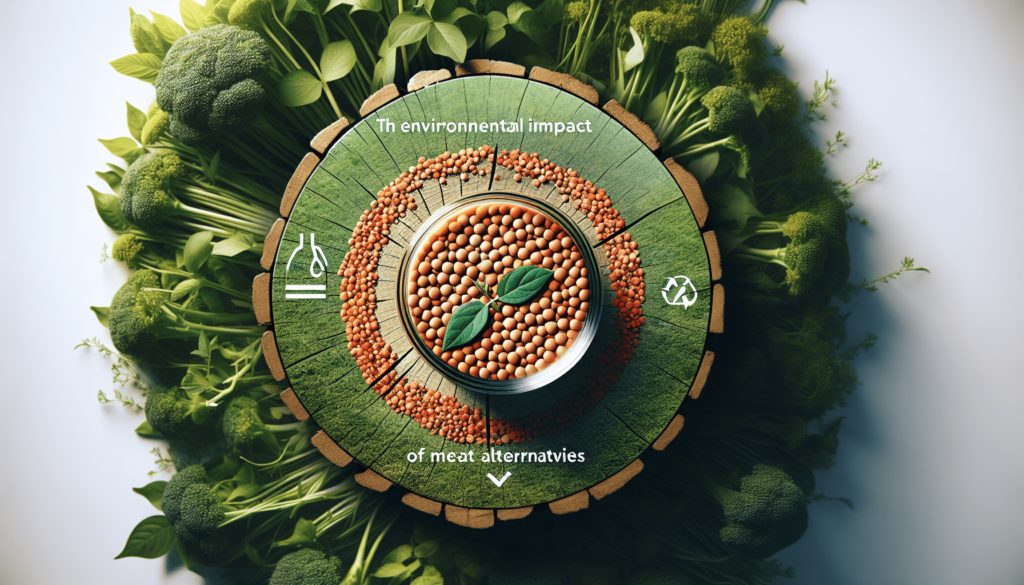You might be surprised to learn about the significant role that meat alternatives play in reducing our environmental impact. While many of us may enjoy the taste and convenience of traditional meat products, it is becoming increasingly important to explore alternative options for the sake of our planet. From plant-based burgers to lab-grown meats, these alternatives offer a promising solution to the environmental challenges posed by the meat industry. In this article, we will take a closer look at the environmental impact of meat alternatives, highlighting the positive changes they can bring about in our quest for a sustainable future.
Reduced Greenhouse Gas Emissions
Decreased Methane Emissions
By opting for meat alternatives, you are actively contributing to the reduction of greenhouse gas emissions, particularly methane. Methane is a potent greenhouse gas that is released during the production and digestion processes of livestock. According to research, livestock farming accounts for a significant portion of global methane emissions. However, by choosing plant-based alternatives, you can play a role in mitigating climate change and reducing the concentration of methane in the atmosphere.
Lower Carbon Footprint
One of the most notable benefits of meat alternatives is their lower carbon footprint compared to traditional meat production. The agricultural practices involved in producing meat, including livestock rearing, feed production, and transportation, contribute to a significant amount of carbon dioxide emissions. Conversely, the production of plant-based alternatives requires fewer resources, such as water and land, and emits fewer greenhouse gases. By reducing your consumption of meat and opting for plant-based alternatives, you can significantly decrease your carbon footprint.
Reduced Deforestation and Land Use
The demand for meat has fueled deforestation and significant land use, particularly for livestock grazing and the cultivation of animal feed crops. This has had devastating consequences for global biodiversity and exacerbated climate change. However, by choosing meat alternatives, you are indirectly supporting reduced deforestation and land use. Plant-based alternatives require considerably less land for cultivation compared to animal agriculture. This shift can help protect precious forest ecosystems and conserve wildlife habitats, ultimately promoting a more sustainable future.
Water Conservation
Decreased Water Usage
The production of meat has a considerable impact on water resources. The rearing of livestock necessitates large quantities of water for drinking, cleaning, and irrigation of feed crops. By opting for meat alternatives, you can significantly decrease your water footprint. Plant-based alternatives require substantially less water for production, reducing the strain on our already limited freshwater resources. By making this simple choice, you contribute to the conservation and responsible management of water.
Reduced Water Pollution
The excessive use of chemical fertilizers, pesticides, and antibiotics in animal agriculture contributes to water pollution. Agricultural runoff from livestock farms can contaminate water bodies, leading to destructive algal blooms and harming aquatic ecosystems. By embracing meat alternatives, you are making a positive impact by reducing water pollution. Plant-based alternatives generally require fewer or no chemicals and antibiotics, minimizing the risk of water pollution and preserving the health of our aquatic ecosystems.
Preservation of Aquatic Ecosystems
Choosing meat alternatives can have a profound impact on the preservation of our fragile aquatic ecosystems. Industrial livestock farming often leads to the degradation of water quality, destruction of wetlands, and loss of biodiversity. By shifting towards plant-based alternatives, you are supporting the preservation of our rivers, lakes, and oceans. A healthy aquatic ecosystem is essential not only for its intrinsic value but also for providing us with clean water, essential nutrients, and a vibrant natural environment.

Decreased Energy Consumption
Lower Energy Inputs for Production
The production of meat requires substantial amounts of energy for various stages, from animal rearing to processing and transportation. On the other hand, meat alternatives generally have lower energy requirements. For example, plant-based proteins often have a lower energy input for cultivation and processing, contributing to overall energy conservation. By choosing meat alternatives, you are indirectly reducing the demand for energy-intensive practices, promoting sustainability, and helping to mitigate climate change.
Reduced Reliance on Fossil Fuels
Animal agriculture heavily relies on fossil fuels for transportation, machinery operation, and feed production. This dependency exacerbates climate change and contributes to air pollution. However, by opting for meat alternatives, you can help decrease our reliance on fossil fuels. Plant-based alternatives typically require fewer transportation miles and less energy for production, resulting in a significant reduction in carbon emissions. By making this choice, you actively contribute to a more sustainable energy landscape.
Energy Efficiency in Processing
Meat alternatives often utilize energy-efficient processing methods compared to traditional meat production. Technologies such as plant-based protein extraction, alternatively sourced ingredients, and innovative cooking techniques can reduce the energy demand of processing. These advancements not only help conserve energy but also have the potential to improve the sustainability of the food industry as a whole. By embracing meat alternatives, you are supporting the development and implementation of energy-efficient processing methods, benefitting both the environment and future generations.
Mitigation of Air and Water Pollution
Less Ammonia Emissions
Livestock farming is a significant source of ammonia emissions, which contribute to air pollution and have adverse effects on human health and the environment. By choosing meat alternatives, you can help mitigate air pollution by reducing ammonia emissions. Plant-based alternatives, being free from animal waste, substantially reduce this harmful pollutant. Your decision to embrace these alternatives promotes cleaner air and supports respiratory health for individuals in your community.
Reduced Nitrogen and Phosphorus Runoff
Animal agriculture is responsible for high levels of nitrogen and phosphorus runoff, primarily from manure and chemical fertilizers. This runoff can lead to water pollution, causing eutrophication, algal blooms, and oxygen depletion in water bodies. By opting for meat alternatives, you contribute to the reduction of nitrogen and phosphorus runoff. Plant-based alternatives generally have lower fertilizer requirements, minimizing the risk of water pollution and fostering the health of our aquatic ecosystems.
Lower Risk of Algal Blooms
Algal blooms, caused by excessive nutrient runoff, pose significant threats to aquatic ecosystems. These blooms not only deplete oxygen levels but also release harmful toxins into the water. By choosing meat alternatives, you are supporting a lower risk of algal blooms by reducing the nutrient load entering water bodies. This choice helps maintain water quality, protecting the diverse array of species that depend on healthy ecosystems for survival.

Preservation of Biodiversity
Less Habitat Destruction
Animal agriculture often leads to extensive deforestation and habitat destruction to accommodate livestock grazing and feed crop cultivation. This loss of habitat is detrimental to countless plant and animal species, accelerating the global decline in biodiversity. By opting for meat alternatives, you indirectly contribute to the preservation of biodiversity. The reduced land use associated with plant-based alternatives helps protect natural habitats, providing refuge for a wide variety of species and enabling the survival of diverse ecosystems.
Reduced Wildlife Displacement
The expansion of animal agriculture has caused the displacement of wildlife populations from their natural habitats, leading to conflicts and biodiversity loss. By choosing meat alternatives, you help reduce wildlife displacement associated with land use changes. With a decreased demand for animal agriculture, fewer habitats will be converted, allowing wildlife populations to thrive without interference. By embracing these alternatives, you become an advocate for coexistence and the protection of the natural world.
Protection of Endangered Species
The preservation of biodiversity also involves ensuring the survival of endangered species. Animal agriculture poses a significant threat to many endangered species due to habitat destruction and illegal wildlife trade. By transitioning to meat alternatives, you actively contribute to the protection of endangered species. This shift reduces the demand for resources that drive habitat destruction and decreases the pressure on vulnerable ecosystems. Your choice can make a difference in securing a future where endangered species thrive and are protected for generations to come.
Improved Soil Health
Decreased Soil Erosion
Animal agriculture is often associated with intensive farming practices that contribute to significant soil erosion. The removal of vegetation for livestock grazing, combined with unsustainable tilling practices, can result in soil degradation and the loss of valuable topsoil. However, by choosing meat alternatives, you indirectly support decreased soil erosion. Plant-based alternatives generally require less land for cultivation, minimizing the disturbance to natural soil structures. Your choice promotes the conservation of soil and helps maintain its fertility for future generations.
Enhanced Soil Fertility
Plant-based alternatives can help enhance soil fertility by providing organic matter and essential nutrients. These alternatives often integrate regenerative farming practices, such as crop rotation and cover crops, which replenish soil nutrients and improve its health. When you choose meat alternatives, you support a more sustainable approach to agriculture that focuses on nurturing the health and vitality of our soils. By prioritizing soil fertility, we pave the way for more resilient agricultural systems that can sustainably feed growing populations.
Less Need for Chemical Fertilizers
The production of animal feed crops often relies on chemical fertilizers to enhance yields. However, the excessive use of these fertilizers can have detrimental effects on soil health, water quality, and biodiversity. By embracing meat alternatives, you contribute to reducing the need for chemical fertilizers. Plant-based alternatives typically require fewer or no chemical inputs, improving soil health and minimizing the risk of widespread pollution. Your choice supports agricultural practices that prioritize natural soil fertility and preservation.
Minimized Antibiotic Resistance
Reduced Use of Antibiotics in Animal Agriculture
The prevalence of antibiotic use in animal agriculture has contributed to the emergence of antibiotic-resistant bacteria, posing a significant threat to human health. By opting for meat alternatives, you indirectly contribute to minimizing antibiotic resistance. Plant-based alternatives have no need for antibiotics, reducing the overall use of these drugs. This shift promotes responsible antibiotic stewardship and safeguards the effectiveness of these drugs for treating human illnesses. By embracing these alternatives, you support a future where antibiotics remain effective in combating bacterial infections.
Lower Risk of Spreading Antibiotic-Resistant Bacteria
The misuse and overuse of antibiotics in animal agriculture can lead to the spread of antibiotic-resistant bacteria, both within farms and beyond. This poses serious health risks for humans and animals alike. However, by choosing meat alternatives, you help reduce the risk of spreading antibiotic-resistant bacteria. Plant-based alternatives prevent the introduction and transmission of antibiotic-resistant pathogens, safeguarding public health and promoting the responsible use of antibiotics. Your decision to embrace these alternatives contributes to a healthier and safer environment for all.
Promotion of Sustainable Farming Practices
Support for Regenerative and Organic Farming
Meat alternatives often align with regenerative and organic farming practices that prioritize soil health, biodiversity, and sustainability. These alternatives provide opportunities to support local farmers who adopt such practices, promoting a more sustainable food system. By choosing meat alternatives, you encourage the expansion of regenerative and organic farming, enhancing the resilience of agricultural systems and providing consumers with environmentally friendly and nutritious options. Your support for sustainable farming practices contributes to a greener future for our planet.
Crop Rotation and Diversification
Plant-based alternatives often incorporate crop rotation and diversification, which benefit soil health and reduce the reliance on chemical inputs. These practices help break pest and disease cycles, enhance nutrient availability, and maintain the natural balance of ecosystems. By embracing meat alternatives, you indirectly support the use of crop rotation and diversification, promoting sustainable agricultural systems. These practices contribute to the preservation of natural resources and the long-term productivity of our farmland.
Use of Cover Crops
An essential component of sustainable agriculture, cover crops provide numerous benefits to the environment and soil health. They help prevent soil erosion, improve moisture retention, and enhance nutrient recycling. By choosing meat alternatives, you contribute to the broader adoption of cover crops. These alternatives often involve the cultivation of plant-based ingredients that can be used as cover crops, supporting their integration into farming systems. By prioritizing the use of cover crops, you positively impact soil health and contribute to the implementation of more sustainable agricultural practices.
Addressing Food Security
Higher Food Production Efficiency
As the global population continues to grow, ensuring sufficient food production becomes increasingly crucial. Meat alternatives offer a pathway to address food security challenges by enhancing food production efficiency. Plant-based proteins often require less land and resources for cultivation, allowing for increased food production per unit of land. Choosing meat alternatives can contribute to a more sustainable and efficient use of resources, ensuring that we can continue to feed the world’s population without further straining our already limited resources.
Reduced Strain on Resources
Animal agriculture places significant strains on resources such as land, water, and energy. The demand for feed crops and grazing areas contributes to deforestation, water scarcity, and greenhouse gas emissions. By transitioning to meat alternatives, you help alleviate the strain on these limited resources. Plant-based alternatives typically require fewer resources for production, enabling a more sustainable use of land, water, and energy. Your choice promotes the responsible and efficient utilization of resources, safeguarding their availability for generations to come.
Improved Access to Nutritious Food
Food security involves not only an adequate quantity of food but also access to nutritious options. By embracing meat alternatives, you contribute to improving access to nutritious food for all. Plant-based alternatives are often rich in essential nutrients, providing a sustainable source of protein, vitamins, and minerals. These alternatives can help address dietary imbalances and promote healthier eating habits. Your choice supports the availability of nutritious food choices, fostering the well-being and resilience of communities around the world.
Social and Ethical Considerations
Ethical Treatment of Animals
For many individuals, ethical concerns surrounding animal welfare are a significant factor in choosing meat alternatives. Animal agriculture often involves practices that raise ethical concerns, such as confined animal feeding operations and inhumane treatment. By opting for meat alternatives, you align your choices with the ethical treatment of animals. These alternatives help create a food system that respects the well-being of animals, promoting compassion and kindness throughout the supply chain.
Support for Fair Labor Practices
The production of meat can be associated with labor practices that raise concerns about worker rights and fair treatment. By choosing meat alternatives, you support fair labor practices within the food industry. Plant-based alternatives often involve the employment of workers in a more equitable and just manner, promoting worker rights and fair compensation. Your choice contributes to a more ethical and responsible food system that values the dignity and well-being of those involved in its production.
Promotion of Food Justice
Food justice encompasses equitable access to healthy and nutritious food for all individuals, regardless of their socio-economic status. By embracing meat alternatives, you actively promote food justice by contributing to a more inclusive food system. Plant-based alternatives offer affordable and nutritious options that can help address food insecurity and improve access to healthier food choices. Your support for these alternatives becomes a catalyst for positive change, fighting against food inequality and ensuring a brighter future for all.

